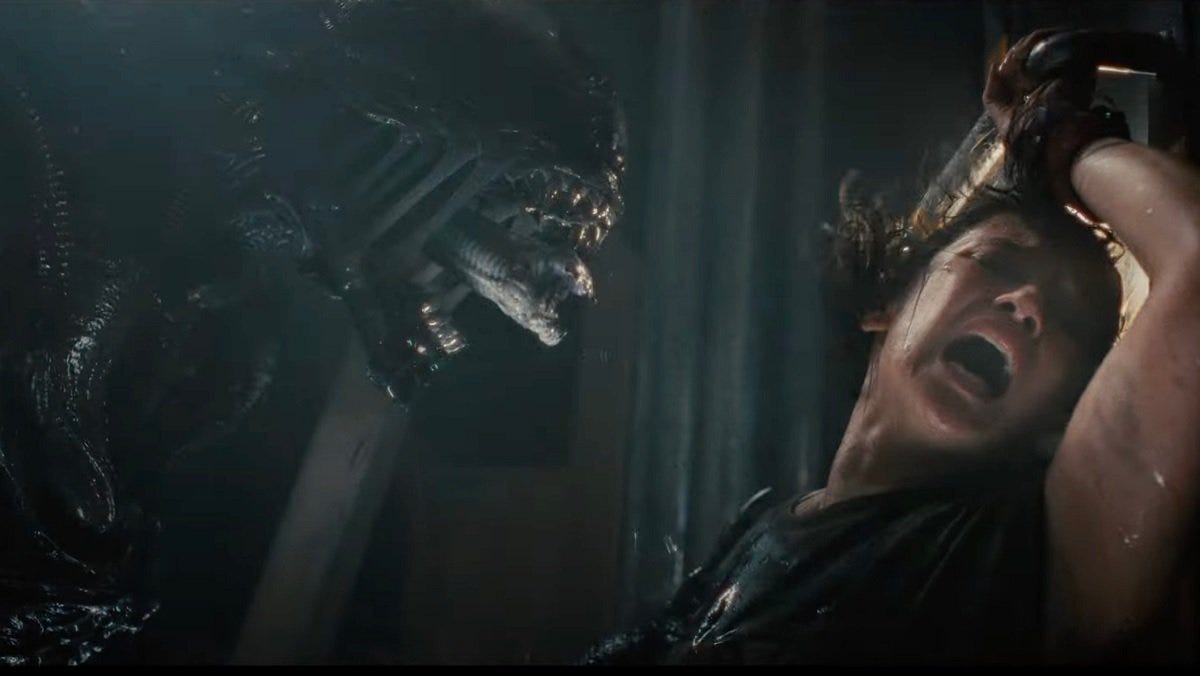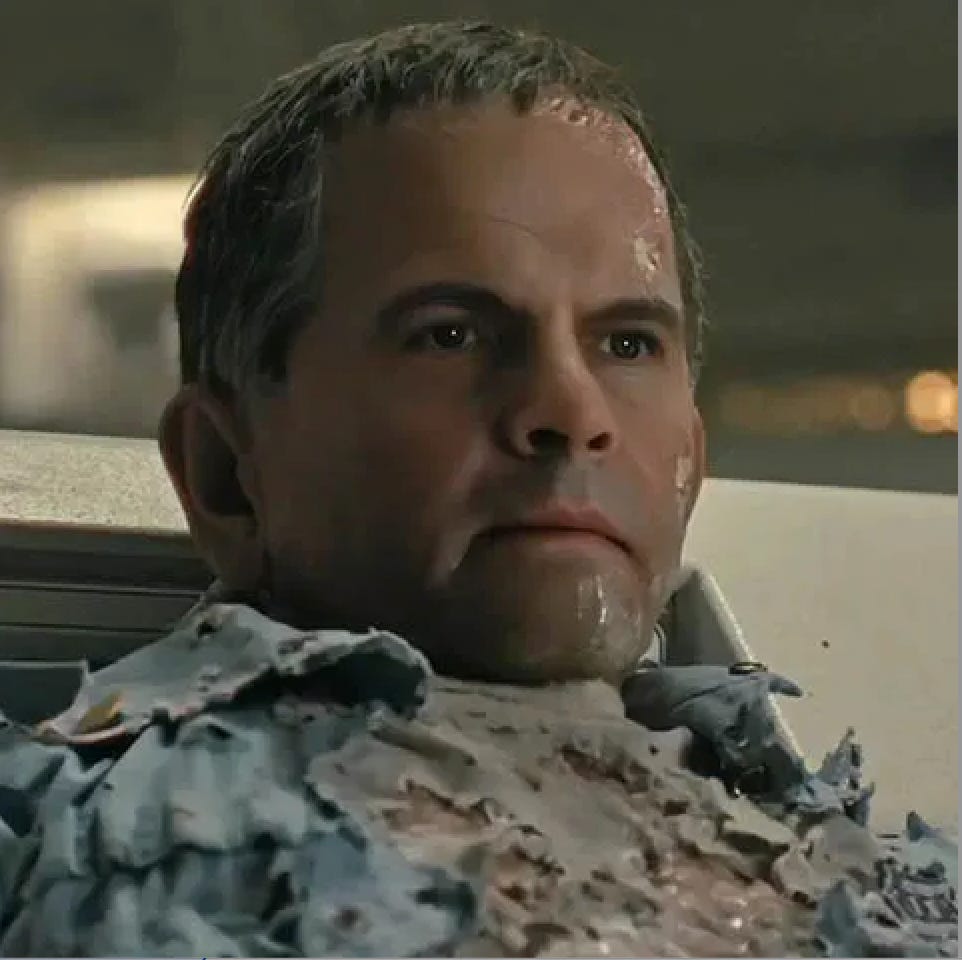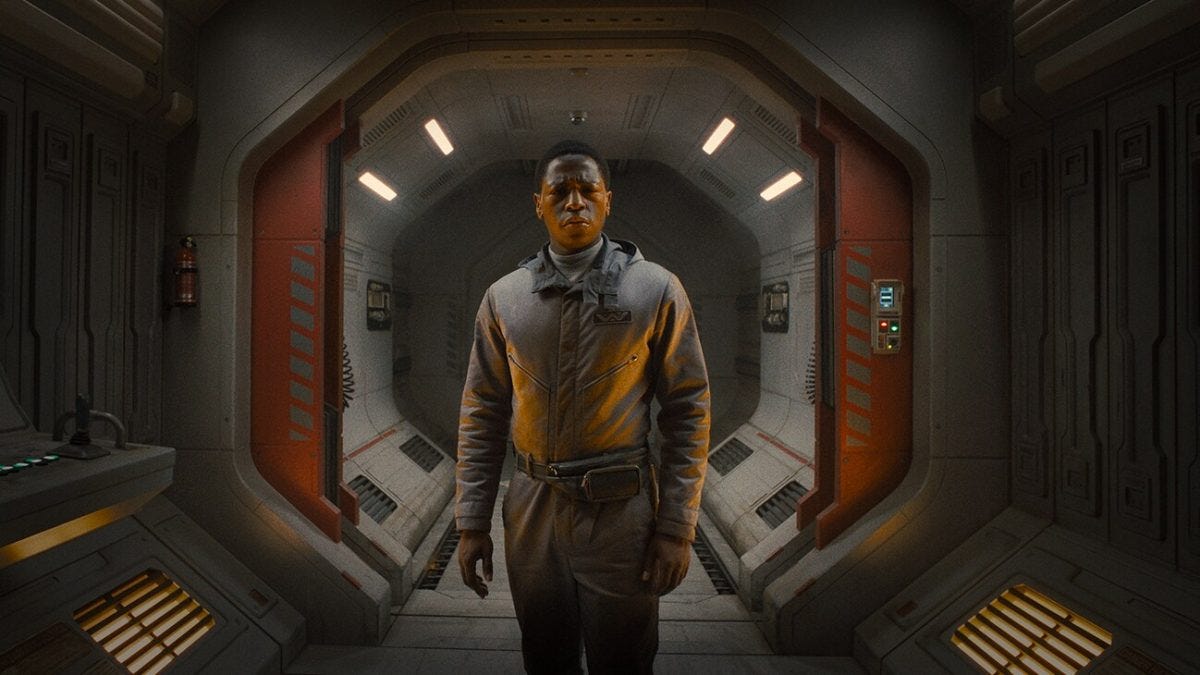In Romulus, Hollywood is the Xenomorph
The corporation replicates and eats and replicates forever.
In the original Alien film the xenomorph was uniquely horrifying in part because of the perverse imaginations and genius effects of the creative team, from Ridley Scott to H.R. Giger. But it was also memorable because it functioned as an ichorous metaphor for predatory, extractive capitalism—a capitalism so rapacious and all-consuming it had a second toothy maw inside its first.
The crew of the rusty, run-down Nostromo were doomed because they were caught between the hunger of their corporate masters and the hunger of the alien—which represented their corporate masters, who wanted to absorb it and turn it to their benefit, as the alien wanted to absorb them and turn them into its own biological processes. Production, reproduction, exploitation; the alien monster baby with acid blood bursting from human stomachs mirrored, and reproduced, the process whereby people are turned into meaty fertile thingness, wet sacks of value to be squeezed until more fluid value comes out.
Romulus, the newest film in the Alien franchise, is set shortly after the events of the first film, and it arguably mirrors that first films themes most faithfully of all the sequels. It also is probably the best movie in the franchise that is not the first two—a low bar, but nonetheless one it’s worth clearing.
—
So, I stayed up till like 2 AM writing this post. This is obviously nobody’s fault but mine! Nonetheless, it was a lot of work, and if you appreciate said work, maybe consider becoming a paid subscriber so I can keep obsessively scribbling and also feeding the cats, who are not aliens but are still cute? It’s $50/year, $5/month.
—
Can a corporation be anti corporate?
Yet, the very fact that Alien has become a franchise film undermines the core anticorporate message. The first movie was, at least to some extent, a scrappy outlier, made for only $11 million despite 20th Century Foxes doubts by people who were for the most part not yet Hollywood power players. Alien can be read as fighting against the studio system and its corporate logic, which has not yet fully digested it. Ripley’s violent disgust as she fights the thing trying to get her to birth its copies parallels, perhaps, Ridley Scott’s visceral loathing of the grim executives lurking just offscreen, trying to turn him into a form they can use.
Whether that reading is fanciful or not, it’s very clear at this point that the Alien franchise, with its endless very big budget sequels, is part of the corporate system of reproduction and exploitation that the original film critiqued. And that creates a number of thematic—and I think aesthetic—problems for Romulus.
The movie’s plot is in some ways even more explicitly anticapitalist than the original’s. Rain (Cailee Spaeny) is a farmer/miner/indentured servant on a godforsaken rock. When the Company unilaterally changes her contract, forcing her to continue working for another five years, she agrees to join her friends in a desperate plan to hijack a derelict ship on an abandoned space station in orbit and flee to a non-corporate planet.
The station, inevitably, is carrying xenomorph specimens, which are (again inevitably) released after a series of unfortunate events. Rain and friends have fled from one group of corporate bloodsuckers into the arms of yet more vampiric monsters. The only difference is that the humans draw out the process of murder over years, while the xenomorphs implant their ravenous offspring and kill you off within the span of a brisk 118 minute runtime.
The twists, the suspense, and the escalating catastrophe are all handled with brisk efficiency, and if the atmosphere and characterization isn’t quite as vivid as in the first film—well, there aren’t a lot of movies that handle atmosphere and characterization as well as the first film.
There are a couple of gratuitous missteps, though, which tip the hand of director Fede Álvarez—and/or the hands of his corporate overlords.
(Spoilers start here if you care about that sort of thing.)
Your death will feed us
The first is the use of Ian Holm. Holm gave an indelible, all-time all-time performance as the chillingly maleolvent android Ash in the original film. He died in 2020, at the age of 88, after a storied career.
And yet. Thanks (or I should say, “Thanks”) to the use of AI, Holm was reincarnated, and his head placed atop a mostly destroyed android named Rook (voiced by Daniel Betts.)
Apparently the filmmakers did pay Holm’s estate, which is nice as far as it goes. But…there is no reason for Ash and Rook to look alike; it’s well established throughout the series that androids don’t all look the same. More, it actually undermines the plot, since we know that whoever Holm is playing is going to be a bad guy. The creators could have kept us in suspense and at least played with the possibility that Rook would be helpful or humane.
Instead, they extracted Holm’s likeness and plopped it on screen just to show they could. They wanted to play with the tech (just as Rook wants to experiment with the alien biotech); they wanted Holm cachet. In a film about the limitless hunger and amorality of corporations, the corporation that made the movie decided to demonstrate its own limitless hunger for power over actors, even after their death, and its own blank amorality.
Part of what was wonderful about Alien was its scrappiness; the way that the filmmaking mimicked and extended the grungy vibe of the soldered together ship and its cranky working-class crew. But with Rook, Romulus lets you see that this is not a grungy, bunged together operation. This is the Company—slick, merciless, uncaring. Whose side are we supposed to be on here, anyway?
Keep the workers in their place
The other ugly note in Romulus involves the character of Andy (David Jonsson). Andy is a run-down android who is effectively Rain’s adopted brother. His programming has degraded, which means that he is mentally and physically disabled. He is loyal though; his programming has one directive, which is to “protect Rain at all costs.” As a result, he barely flinches when he learns that he will be decommissioned when they reach safety; non corporate outposts do not allow artificial persons to enter.
The Black crew member in the first Alien film—Yaphet Kotto as Parker—didn’t get a ton of screentime, but he was notably treated as one of the crew; put upon, exploited, irritated, and resentful just like his white peers. Andy, in contrast, is not human. He’s a trope—the loyal Black friend who sacrifices himself for the main character without question.
Or at least, he is until Rain and company have to upgrade him in order to allow him to better communicate with the station’s systems. The upgrade fixes Andy’s mental and physical limitations; he becomes stronger and smarter than his human (and non-Black) companions, rather than weaker and less intelligent than them. The new programming also, though, overwrites his loyalty to Rain. He becomes a literal corporate stooge, with his first directive to protect the company.
Andy is a good guy as long as he is weak and unquestioningly loyal. As soon as he becomes equal to, or better than, the white protagonist, he turns into an untrustworthy corporate sellout. Per the script of neoconfederate films like Birth of a Nation Black people may be virtuous when they are subservient and comical, but when they get above themselves (ie, above white people) they are dangerous, inhuman, corrupt symbols of illegitimate power.
Andy eventually returns to good, weak, subservient Andy, and Rain changes his programming so he can care about himself as well as about her. He has a few minutes of screentime as a free person before he is mortally wounded trying to protect Rain. End of parable.
David Jonsson, not coincidentally, is far and away the most magnetic and impressive actor in the film; he accomplishes the transformation as he is upgraded with subtle shifts in posture and expression; he looks the same, but he also looks completely different. The actor highlights Andy’s pride in his new abilities with only a little help from the text. Andy is, in a real sense, the only character who really has an arc, and he explores it fully, off to the side, where he is relegated because he’s an android (diagetically) and because (diagetically and otherwise) he’s Black.
The exploitation of Holm’s image is an example of up-to-date capitalist innovation; the corporation advancing to new planets and new frontiers to develop the new (alien or otherwise) tech and find ever more exciting ways to use human souls, bodies, and products for new purposes.
The exploitation of Jonsson, in contrast, fits an older pattern—as the aliens themselves hark back to an atavistic proto capitalism of eat or be eaten. Hollywood has long built capitalist wealth by using talented Black actors (like, say Hattie McDaniel) to tell racist stories.
The capitalist future of the Alien universe is colorblind. But that is, Romulus makes clear, only a pretense, much like Rook’s pretense of friendliness. The corporation lies about its intentions the better to implant the aliens, and/or the better to advance racist narratives which enable more efficient and thoroughgoing control and exploitation.
It can’t be killed
As blockbuster franchises go, Romulus isn’t a bad film. But it suffers from the perennial blockbuster problem, which is that it doesn’t believe in its own world or its own themes—or, perhaps more accurately, it doesn’t care whether it believes in them or not.
Alien really, viscerally, embraced its anticorporate disgust—it looked down that gullet close enough to see that the only thing in there was more teeth. Romulus, in contrast, has anti corporate themes because Alien had anticorporate themes, and Romulus wants to give you that old Alien feeling so you’ll hand over your money, just as it cuts off Ian Holm’s face and puts it on another dude just because Ian Holmes was in that first movie you all liked.
The Company, like the franchise, like the aliens, will keep rebirthing itself, until we are all dead—though, as Ian Holm demonstrates, even that may not stop them.





The first “Alien” movie is still the scariest film I have ever seen. The monster itself is the most frightening, the dark ship interior, the increasing dread of the crew.... I swear the music is enough to raise the hair on the back of my neck.
The sequels aren’t equal to the first but I still watch them all and look forward to seeing this latest. May the Alien live on!!
Gonna be that guy again—it's "Ian HOLM", not "Ian Holmes"....
https://en.wikipedia.org/wiki/Ian_Holm
Though since Wikipedia mistakenly gives him a knighthood (he's a "Commander of the British Empire", not a "Knight Commander of the British Empire"!), maybe it's "Ian Helms"...?